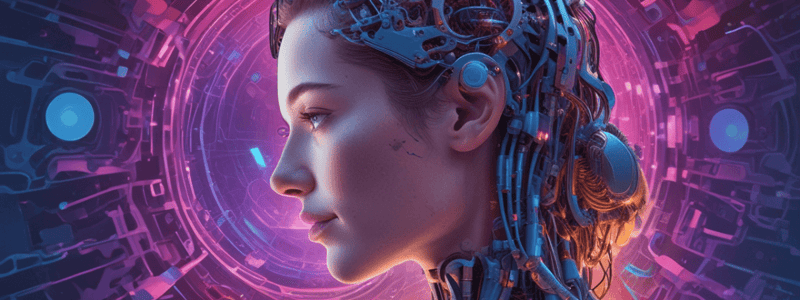Podcast
Questions and Answers
El software de reconocimiento facial puede ser menos preciso para ciertos grupos de personas debido a diferencias en el color de piel.
El software de reconocimiento facial puede ser menos preciso para ciertos grupos de personas debido a diferencias en el color de piel.
True (A)
Los investigadores sugieren invertir en programas educativos multidisciplinarios centrados en diversidad e inclusión para abordar los desafíos relacionados con la IA.
Los investigadores sugieren invertir en programas educativos multidisciplinarios centrados en diversidad e inclusión para abordar los desafíos relacionados con la IA.
True (A)
El enfoque 'Always Be Citing' propone que cualquier producción de IA cite automáticamente su origen como un programa de IA.
El enfoque 'Always Be Citing' propone que cualquier producción de IA cite automáticamente su origen como un programa de IA.
True (A)
Algunos expertos consideran que las leyes de derechos de autor actuales podrían ser suficientes para abordar las creaciones generadas por IA.
Algunos expertos consideran que las leyes de derechos de autor actuales podrían ser suficientes para abordar las creaciones generadas por IA.
Existe consenso absoluto entre los expertos sobre cómo manejar los problemas de IPR derivados de las creaciones de IA.
Existe consenso absoluto entre los expertos sobre cómo manejar los problemas de IPR derivados de las creaciones de IA.
Flashcards are hidden until you start studying
Study Notes
Ethics and Artificial Intelligence
Artificial intelligence (AI) is rapidly transforming industries from healthcare to transportation, and its ethical implications have become increasingly important to consider. AI has potential benefits, including improved efficiency and increased accuracy of processes, but it also raises several major concerns related to ethics, equity, and intellectual property rights.
Responsibility Ethics
The responsibility of creating safe AI systems falls upon both developers and users. Developers must ensure their algorithms do not reinforce existing biases, which can lead to discriminatory behavior. They need to understand these patterns and develop solutions that mitigate them. Users must use AI responsibly by being aware of any risks associated with the technology they're using, such as privacy violations, misinformation spreading, and automated decision making that could unfairly impact people's lives.
Developers and users must work together to create fair AI systems that benefit everyone. This involves making sure AI doesn't reinforce harmful stereotypes and instead promotes positive behaviors. It also means addressing the consequences of AI misuse, like cyberbullying, data leaks, and job displacement.
Equity and Justice
Equity is another critical concern when discussing ethics and AI. If AI simply mimics human bias rather than acting fairly, we risk perpetuating the unjust status quo through automation. For example, if facial recognition software is less accurate for certain groups of people due to differences in skin color, this can create serious issues in areas like law enforcement and hiring practices.
To address these challenges, researchers propose measures like investing in multidisciplinary education programs focused on diversity and inclusion, developing more inclusive datasets, and promoting transparency in AI development so all stakeholders can participate in shaping AI's future.
Intellectual Property Rights (IPR) - Copyright Laws
In the context of copyright laws, AI creates new challenges. As AI becomes more capable, it may be able to generate material that humans would normally claim authorship over. However, traditional legal frameworks don't account for these situations easily. There are ongoing debates about whether creators should have ownership of AI-generated works, especially since the AI itself isn't capable of understanding (or caring about) the value of its own creations.
One possible solution is the 'Always Be Citing' approach. In this method, any AI output would automatically cite its origin as an AI program, ensuring proper attribution while emphasizing that the AI didn't consciously create anything. Another idea is to redefine copyright law to reflect the role of machine learning systems in creation, possibly granting limited rights to creators who train them.
However, there is disagreement among experts regarding how best to manage IPR issues arising from AI creations. Some argue that current copyright laws might be sufficient, given the limitations of AI and human involvement required in its operation. Others believe that new regulations specifically tailored to artificial creativity are necessary. Regardless of the chosen path, it's clear that careful consideration must be given to ensure that AI innovation contributes positively to society without infringing upon existing authors' rights.
Studying That Suits You
Use AI to generate personalized quizzes and flashcards to suit your learning preferences.




